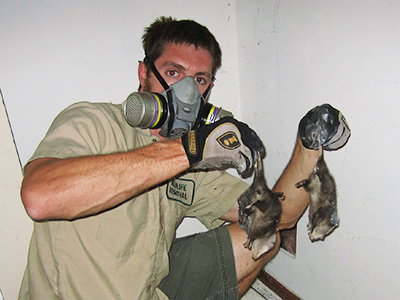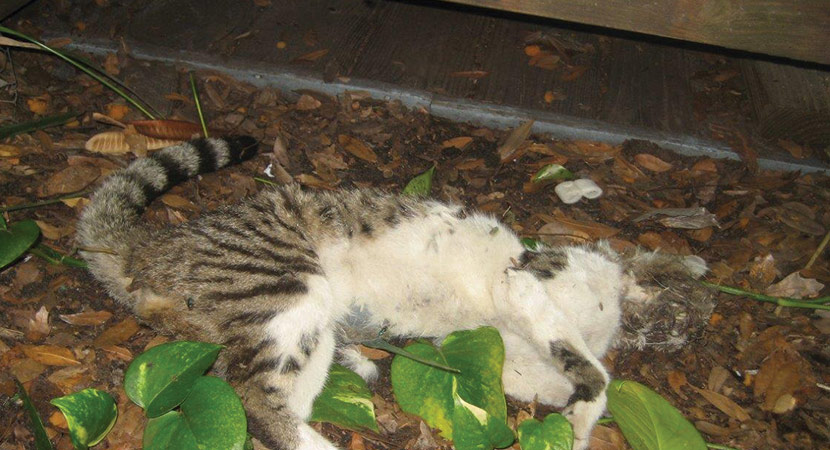Call me: 706-671-6130
Welcome to Columbus Dead Animal Removal! Got a terrible smell in your house, or do you see a dead critter on your property? We are an animal control company specializing in the removal of dead animals from your home, attic, basement, walls, yard, or any part of your property. You clearly don't want a dead animal in your house. Carcasses attract flies and give off terrible smells, not to mention the potential diseases rotting flesh can cause. Whenever we remove dead animals, we use 100% safe methods and make sure to disinfect your home and get rid of all traces of odor. Click here for Free Roadkill Removal and click here for Dead Pet Body Removal. For deceased wild animals in your home or property, call us anytime at 706-671-6130 to schedule an appointment for today! We come out fast! Some of the services we offer include:
- Dead Animal Removal
- Foul Odor Diagnosis
- Full Property Inspections
- House Damage Repairs
- Dead Body Location Services
- Proper Carcass Disposal
- Cleanup & Decontamination Services
- Deodorization Services
CALL US ANYTIME AT 706-671-6130

Our number one priority here at Columbus Dead Animal is to make sure that your home is a safe one to live in – and it won’t be all the while dead or alive wild animals are present. Thankfully, we have a range of services that we can offer you, all usually available on the same day that you call us, with highly trained technicians that carry full commercial liability insurance. If you’ve noticed an unpleasant scent lingering around your home or business, a dead animal could be the cause. We can find that animal, remove it, dispose of it safely and legally, and then prevent others from doing the same thing. Entrance points are properly sealed, using hardy and durable materials. Areas of damage are repaired and restored, preventing weak and vulnerable spots from becoming prey to wild animal attack. All material related to the animal will be cleared away, and any affected areas decontaminated and sanitised. In doing so, the disease risk that is so high with dead animals, is completely eliminated. Without a full sanitation service, the threat of disease still looms. Our fully-encompassing service works hard to prevent future problems with wild animals from developing – and that’s what makes us so hard to beat. (Just ask our thousands of satisfied customers!)
What Prices Do We Charge?
Learn about dead animal removal costs - each situation is different!
What if you found roadkill or a dead animal such as a deer in a public place, and you want the city or Muscogee County services to remove it for free? Click here for Free Muscogee County Dead Animal Removal services. What if a farm animal like a horse, or your beloved pet dog or pet cat has died and you need the body taken away? Click here for Dead Pet Body Removal.
We are experts in dead animal removal, and take our job seriously. When removing dead animals, we do a COMPLETE job — not only do we remove the dead animal from your home or yard, we also decontaminate the area, deodorize it, and dispose of the animal or cremate it. If you aren't sure whether the stench in your house is due to a rotting carcass or another reason, we can sniff it out with our noses from our years of experience. We remove dead raccoons, dead opossums, dead skunks, dead squirrels, dead birds, even dead dogs and cats. We frequently remove dead rodents from inside walls, because poison kills rats and mice, who die in your house. We completely solve your dead animal problem by taking these steps:
- Sniff out the dead animal if it is somewhere in your home
- When necessary, for example if the animal is in a wall or under your house, cut a hole to remove the animal
- Remove the dead animal, safely and completely (and seal the hole if needed)
- Finish the job by decontaminating and deodorizing your home
- Properly dispose of the dead animal through incineration or other means
- Prevent it from happening again by finding out how they got in your house
Dead animal carcass removal is specialty work. Sometimes the job is simple, such as a dead opossum in the yard, in which case we can simply wear our gloves and respirator mask, bag the carcass, and take it away for incineration. Sometimes this is more complex, such as when the dead animal is under a home crawlspace, under a porch or deck or shed. Or if the animal is larger, such as a dog or a deer. The most complex cases are dead animals inside the house. The animal may have died inside the attic, or down in the walls, or the duct work, or any other part of the architecture. You may have a bad smell in your home, and you're not even sure what's causing it. We've removed not just dead animals, but rotting food, bad mold, etc. We specialize in locating the source of the smell, and we very commonly cut a hole in the ceiling or wall to remove the animal. We remove every bit of the carcass, mop up the juices, vacuum the maggots, spray it and wipe it down with disinfectant, cleaner, and we repair the hole we cut. In some cases we use ozone machines to neutralize odor.
Columbus Dead Animal Tip: Does a Dead Animal Carcass Cause Flies?

A dead animal is a breeding ground for a wide variety of organisms, ranging from bacteria to roaches. And as you probably know, flies are the main invitee to this party! These organisms are referred to as decomposers, and they help to break down the organic matter during the decomposition process. In this article, we focus our attention on the role flies play in the decomposition process.
The role of blowflies in the decomposition of carcasses
Blowflies are a family of insects in the fly order, Diptera. They are characterized by a metallic blue, green, or black color. Blowflies are attracted to decaying flesh and are typically the first organisms to come into contact with dead animals. According to scientific studies, blowflies can locate a dead animal just within 20 minutes of the animal’s death. When an animal dies, decomposition commences. The decomposition process involves the breaking down of the organic matter by decomposers. Competition is fierce among these decomposers, all vying to get their due share of flesh. By getting to the feasting party on time, blowflies have the extra advantage.
Once they land there, they lay their eggs on the carcass. A single blowfly lays about 250 eggs. Within an hour, the eggs hatch into maggots. For the next 5 - 7 days, the maggots will feed on the flesh of the carcass. Thereafter, they leave the carcass and wander in search of a dry place to pupate. In less than a week, these maggots will turn into adult flies.
Are blowflies dangerous?
While blowflies themselves are harmless, they can transmit diseases. How? When blowflies land on carcasses, they can carry pathogens on their feet. If these flies then land on your food, they can transmit these harmful pathogens to humans. That’s why you should ensure these flies are nowhere inside your house. If you notice a high activity of blowflies in your yard, chances are there is a dead animal on your property or in your house. Getting rid of the carcass is the only way to stop the fly infestation.
How to deal with fly Infestations on carcasses
Here’s how you can go about getting rid of flies:
Find the infestation sources
As noted earlier, flesh flies and blowflies are attracted to decaying organic matter. This may be a dead animal or decomposing garbage. Follow the flies and they will lead you to what is attracting them. These flies are harmless and do not bite, so you don’t have to worry about getting attacked.
Eliminating flesh flies
Once you determine what’s attracting them, then you need to cut off access to it.
If it’s a dead animal, put the carcass in an airtight container before disposing of it properly. That way, these flies won’t be able to lay their eggs on it.
If it’s animal droppings or other organic waste that’s attracting them, scoop up the waste with a shovel and throw it in a plastic or garbage bag. Ensure you tie it properly once you’re done. Take it to the landfill or dispose of it with the rest of your trash during trash removal day.
Even after you’ve gotten rid of the carcass, the bodily fluids of the carcass may still attract flies. In that case, you can spray pyrethrin or another insecticide to eliminate adult flies. Most insecticides are suited for outdoor use. Thereafter, you can use your vacuum cleaner to suck up the dead flies, maggots, and other debris. Flies that are alive get mixed with the dust in the bag and die quickly. Ensure you seal the bag once you’re done. Then dispose of it.
Preventing the problem from reoccurring
Dead animals will always attract flies. The only way to ensure this doesn’t happen is to make sure you do not have a wildlife infestation problem. Seal up all potential entry holes for rodents and larger wildlife so they have no access to your house. Also, properly handle your trash, pet food, and bird feeder, so there isn't food to attract wildlife to your property. If you cut out access to food and shelter, you will drastically reduce the likelihood of dealing with this problem.
We service nearby towns such as Buena Vista, Bibb City, Hamilton, Lumpkin,.